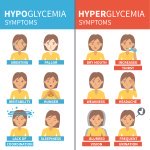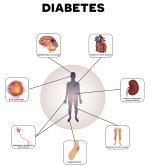The Early Symptoms of Diabetes
Lets talk about the early symptoms of diabetes you need to be aware of. Diabetes affects millions of people all over the world. In the United States alone, close to 23 million people are affected by it. Regarded as one of the major causes of death in the world, Diabetes mellitus is considered a serious health risk, most especially if not taken care of in a timely manner. The first signs of diabetes mellitus can be difficult to recognize.
Early Symptoms of Diabetes Often Go Undetected
Out of the millions of people affected by diabetes, about half of them are unaware they have the disease. It is not uncommon for diabetes to go undetected at the beginning. The early warning signs and symptoms can be difficult to distinguish from other simple problems. Often time, the very first signs of diabetes can be so minute, you may possibly not even recognize them.
Diabetes mellitus is a somewhat complex type of metabolic disorder, the early symptoms of which seem to be so absolutely harmless in nature, that they very often go unnoticed by many patients. The early symptoms of diabetes mellitus such as excessive dryness of the mouth and persistent thirst, exhaustion and fatigue, unexplained weight loss, frequent urination, skin dryness and flakiness, excessive hunger, numbness and tingling sensation in the extremities of your body such as your feet, hand and fingers, leg pain at the time of walking, etc are all indications of the onset of this complex illness. If unattended, then diabetes cause complications such as diabetic nephropathy, diabetic retinopathy, strokes, heart disease, diabetic neuropathy, foot ulcers or even amputation of a limb.
Excessive Thirst and Frequent Peeing
If you are peeing and getting thirsty more than usual, you might be diabetes. The average person pee between five to eight times within 24 hours, but people with diabetes may go a lot more. Why? Generally, your body absorbs glucose as it makes its way through your kidneys, but when diabetes pushes your blood sugar level up, your body system may not be able to bring it all back in. Instead, it will try to get rid of the extra sugar by making more urine, and that takes a lot of fluid (water). Because you are urinating so much, you will get thirsty. When you drink more, you will also urinate more.
Hunger and Fatigue
Naturally, your body converts the food you eat into glucose which your cell use for energy. However, your cell needs insulin to convert the glucose into usable energy. If your body doesn’t make enough of the insulin or your cell resist the insulin your body makes, the glucose in your body becomes useless which would make you exhausted and fatigued. This can make you tired and hungry than usual and is often one of the earliest signs of diabetes.
Sudden and Unplanned Weight Loss
Diabetes can cause serious weight loss. If your body can get energy from the food you eat, it will start burning fats and muscles for energy instead. This would make you lose weight even though you haven’t changed the way you eat.
Nausea and Vomiting
When your body resorts to burning fat instead of glucose, it makes “ketones.” This substance can build up in your blood to dangerous levels, a life-threatening condition called diabetic Ketoacidosis. The ketones can make you feel sick to your stomach, causing you to vomit. Constant nauseating and vomiting could signal the onset of diabetes.
Dry mouth and itchy skin
There is less moisture for other purposes because your body is using fluid to make more urine. Getting easily dehydrated is a sign that you have some problem and it could be diabetes. When you get dehydrated and your mouth feels dry, go for a check. Don’t take it for granted when your skin is dry and itchy.
Blurred Vision
If you notice your vision suddenly starts to get blurred, go for a checkup, it could be diabetes. Changing fluid level in the body can make the lenses in your eyes swell up. This would change their shape and make them lose the ability to focus.
Conclusion
The sooner you act on these early symptoms of diabetes the better your chances of being properly diagnosed. This is important because while diabetes mellitus does not have any specific cure, it can be effectively managed with a healthy diet, exercise and medication. Proper management is important to minimizing the complication it causes and living a healthy and fulfilled life.



New! Facebook Comments
What do you think? Share your thoughts below...